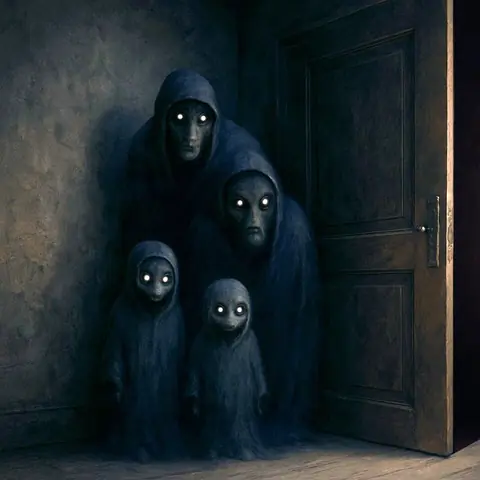There is a mysterious feeling - one that laws cannot explain and senses cannot fully grasp - that sometimes creeps over us when we step into a dimly lit room, hear a faint rustling from a quiet corner, or awaken at night to the sound of footsteps without a visible source.
In such moments, old memories from Arab folklore may resurface: the memory of ʿUmmār al-Makān the inhabitants of the place.
In Arab popular culture, ʿUmmār al-Makān are unseen beings, often linked to the realm of jinn.
They are believed to quietly coexist with humans, inhabiting homes, yards, and familiar spaces.
They are not usually visible, but their presence is felt.
They do not harm those who respect their space, but they are said to become angered if their boundaries are violated.
Their existence is not meant to terrify; it is more like a silent cohabitation — a delicate balance between the visible and invisible worlds.
According to traditional beliefs, they prefer abandoned places, neglected corners, dark attics, wells, and old stables.
Elderly women used to say, "They dwell where echoes are louder than human voices."
They are neither ghosts nor spirits of the dead; they are unique entities, who sometimes brush past our world in fleeting moments.
The Hidden Rituals: How People Coexist with the Inhabitants
In Arab folklore, ʿUmmār al-Makān are not dismissed as mere superstitions, but treated with a mix of respect, caution, and silent understanding.
- In the Maghreb (North Africa), it is customary to sprinkle water when opening the door to an abandoned house, or to greet unseen residents by saying, "Peace be upon those who dwell here."
In some villages, people place salt or burn incense in the corners when moving into a new home — a gesture to calm the unseen "neighbors."
- In Egyptian villages, if strange sounds are heard at night - furniture moving or footsteps - the blame is not cast on ghosts, but on ʿUmmār al-Makān.
Families avoid leaving rooms completely dark, and children are discouraged from screaming or running at night "to avoid disturbing the old dwellers."
- In the Levant and Gulf regions, a common custom persists: before pouring hot water into sinks, gardens, or deserted spaces, one says, "Dastoor ya Haadireen" ("Permission, O you who are present") - a form of polite warning to unseen inhabitants to avoid unintentionally harming them.
Across all these traditions, there is an implicit etiquette:
No cursing, no confrontation - only silent respect.
These beings are not viewed as evil spirits, but rather as ancient residents, guardians of a place’s unseen memory, preserving balance if left undisturbed.
Real Encounters: Stories Beyond Legends
Across Arab forums and storytelling circles, real-life encounters attributed to ʿUmmār al-Makān continue to emerge:
Ahmed from Egypt shared a chilling story: at seventeen, he slept in an empty room at his uncle’s home despite warnings.
A foul odor like rotting meat filled the air, followed by the vision of an old woman sitting silently at the edge of the bed.
She eventually faded away, leaving only her scent behind.
His grandmother later told him calmly: "She is the guardian of this place; she will not harm you, unless you disturb her."
On another occasion, Ahmed saw what he thought was a house across the rooftop — only to discover the next morning that the land was completely empty.
- In Algeria, a girl living alone heard faint footsteps from her kitchen every night until she began regularly reciting verses from the Qur'an — after which the sounds ceased.
- In Kuwait, a young man described seeing a tall shadowy figure standing silently at the door of his grandfather's old house.
His grandmother reassured him: "That’s one of the inhabitants of the house. Do not be afraid — they were here before us."
- In rural Syria, an elderly woman still sprinkles water and salt in a corner of her home each morning — "a gesture of peace for those who share the house in silence," she says.
The Islamic Perspective: Balance Between Belief and Protection
Although the exact term ʿUmmār al-Makān does not appear explicitly in Islamic texts, Islam acknowledges the existence of the jinn - unseen beings, some good, some not.
It encourages believers to protect themselves and their homes through reciting the Qur'an, especially Surah al-Baqarah (Chapter 2), and through simple daily prayers.
The Prophet Muhammad said:
"Do not turn your houses into graves. Satan flees from a house in which Surah al-Baqarah is recited."
Islam teaches that we should not fear the jinn, nor obsess over them.
Respectful coexistence is encouraged: no harm without cause, no hostility without evidence.
If odd occurrences happen, Muslims are advised to respond with calmness, Qur'anic recitation, and remembrance of God.
When Science Speaks
Science does not affirm the existence of unseen beings, but it offers explanations for many of the sensations attributed to them:
- Infrasound: Very low-frequency sounds, imperceptible to human ears, can cause feelings of anxiety, fear, or the eerie sensation of being watched.
- Sleep Paralysis (The Night Hag): A state between sleep and wakefulness where the brain is alert but the body is paralyzed, often accompanied by vivid hallucinations of shadows or heavy presences.
- Structural Noises: The creaking of wood, contraction of pipes, and air drafts in old buildings can produce noises resembling footsteps or knocks.
- Psychological Effects: Stress, loneliness, and sensory deprivation can lead the mind to create "phantom perceptions," especially in those raised within cultures rich in supernatural narratives.
A Story Without an Ending
Between faith and science, between folklore and personal experience,
Ummār al-Makān remain enigmatic figures - neither fully proven nor entirely denied.
They linger in fireside tales, in whispered prayers before entering an empty house, and in that fleeting shiver when you feel someone passing by… and find no one there.
Are they truly ancient neighbors sharing our homes ?
Or reflections of our ancient longing for unseen companionship, breathing life into every silent space?
We do not know for sure.
But still, out of an old habit, we may whisper at a shadowy threshold:
"Dastoor ya Ahl al-Makān…" - "Permission, O inhabitants of the place…"







No comments:
Post a Comment